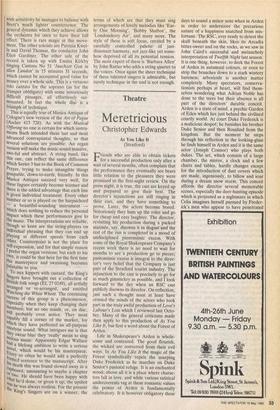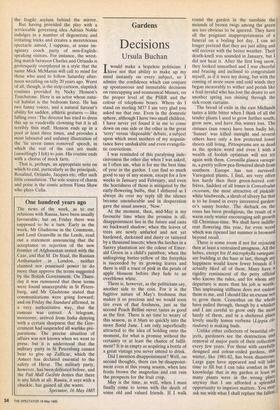Theatre
Meretricious
Christopher Edwards
As You Like It (Stratford)
vriends who are able to obtain tickets IL for a successful production only after a wait of several months, often complain that the performance they eventually see bears little relation to the pleasures they were promised in the first-night review. On the press night, it is true, the cast are keyed up and prepared to give their best. The director's injunctions are still ringing in their ears, and they have something to prove. Later, the actors become bored. Notoriously they ham up the roles and go for cheap and easy laughter. The director, revisiting his production during a packed matinee, say, disowns it in disgust and the rest of the run is completed in a mood of undisciplined pantomimic excess. With some of the Royal Shakespeare Company's recent work there is no need to wait for months to see a production go to pieces; pantomimic excess is integral to the direc- tor's very belief that the Company is just part of the Stratford tourist industry. The injunction to the cast is precisely to go for as much gimmickry as possible, and I look forward to the day when an RSC cast publicly disowns its director. On reflection, just such a thought must at least have crossed the minds of the actors who took part in the truly awful production of Love's Labour's Lost which I reviewed last Octo- ber. Many of the general criticisms made then apply to this production of As You Like It, but first a word about the Forest of Arden.
Life in Shakespeare's Arden is whole- some and contented. The good flourish, the wicked are converted from their evil ways. In As You Like It the magic of the Forest symbolically repels the usurping Duke Frederick as he marches on Duke Senior's pastoral refuge. It is an enchanted wood; above all it is a place where charac- ters fall in love, and while various satirical undercurrents tug at these romantic values the power of Arden is fundamentally celebratory. It is however obligatory these days to sound a minor note when in Arden in order to underscore the precarious nature of a happiness snatched from mis- fortune. The RSC, ever ready to detect the skull beneath the skin, likes its Arcadia bitter-sweet and on the rocks, as we saw in John Caird's successful and melancholy interpretation of Twelfth Night last season. It is one thing, however, to deck the Forest of Arden in autumnal colours, or even to strip the branches down to a stark wintery bareness; arboricide is another matter completely. Many spectators, conserva- tionists perhaps at heart, will find them- selves wondering what Adrian Noble has done to the trees but their absence is all part of the directors' durable conceit. Arden is a state of mind, a psychic Garden of Eden which lies just behind the civilised courtly world. At court Duke Frederick is a malicious despot; he banishes his brother Duke Senior and then Rosalind from the kingdom. But the moment he steps through his reflection in the looking-glass he finds himself in Arden and it is the same actor (Joseph Connor) who plays both dukes. The set, which consists of a large chamber, the mirror, a clock and a few chairs and tables, hardly changes except for the introduction of dust covers which are made, ingeniously, to billow and soar during a dream snow storm. This conceit affords the director several memorable scenes, especially the deer-hunting episode which is projected as a nightmare in which Celia imagines herself pursued by Freder- ick's men who appear to have penetrated
the fragile asylum behind the mirror.
But having provided the play with a serviceable governing idea Adrian Noble indulges in a number of degenerate and irritating tricks and creates a meretricious spectacle aimed, I suppose, at some im- aginary coach party of non-English- speaking visitors. For instance, the wrest- ling match between Charles and Orlando is grotesquely overplayed in a style that the name Mick McManus will call to mind for those who used to follow Saturday after- noon wrestling on telly 20 years ago. Worst of all, though, is the strip cartoon, slapstick routines provided by Nicky Henson's Touchstone. Here is an actor whose natu- ral habitat is the bedroom farce. He has two funny voices, and a natural farceur's ability for sudden, athletic gestures — like falling over. The director has tried to dress this up as vaudeville clowning but it is all terribly thin stuff. Henson ends up in a pool at least three times, and provides a most laboured and unfunny illustration of the 'lie seven times removed' speech, in which the rest of the cast are made (unwillingly I felt) to join. His routine ends with a chorus of mock farts.
That is, perhaps, an appropriate note on which to end, particularly as the principals, Rosalind, Orlando, Jacques etc, offer such little consolation. The sole source of charm and poise is the comic actress Fiona Shaw who plays Celia.















































 Previous page
Previous page